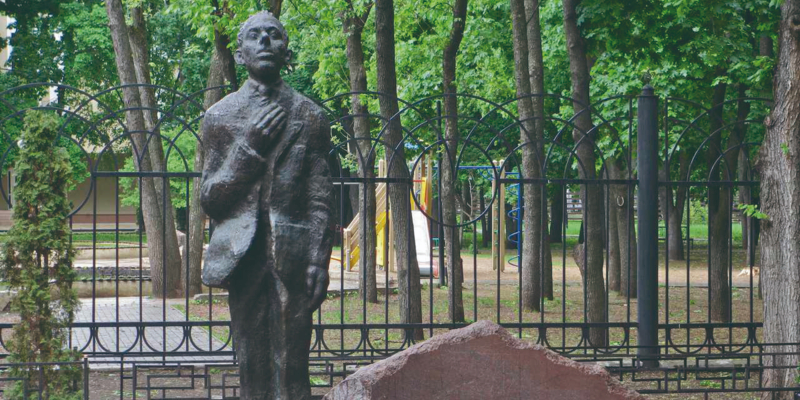The first time I heard about Osip Mandelstam was from a well-known Spanish politician who had read him during his years in prison. There are many literary works that were born in captivity: just think of Cervantes in Algiers, Solzhenitsyn in the Siberian Gulag or many others such as St. John of the Cross or Nelson Mandela.
The great poet Osip Mandelstam, born in Warsaw in 1891 in a Jewish-Polish family and educated in St. Petersburg, Paris and Heidelberg, would be arrested in May 1934 and sentenced to exile for writing a short Epigram against Stalin of only sixteen verses. Apparently, in Russian it is a most beautiful poem and in it Mandelstam mentions Stalin's thick fingers, greasy as worms, and his cockroach whiskers. "His example moves me and makes me reflect on the truth and the value of the word in a society where charlatans rule and information has become a spectacle. I too am not free from this kind of spectacle.l", wrote journalist Pedro G. Cuartango a few months ago. His wife Nadiezhda remembered what Mandelstam said about Russia: "This is the only country that respects poetry: they kill for it. Nowhere else does that happen".
Osip Mandelstam died in a transit camp near Vladivostok in May 1938. We owe to his wife Nadiezhda the preservation of many of his texts and the shocking book Against All Hope, in which she recounts the tragic experiences she lived with her husband during the years of terror. I only want to bring up here two passages from that book.
The first one -referring to 1934- is this: "Seventeen years of conscientious [communist] education had been to no avail. The people who collected money for us and those who gave it violated the whole code established in the country of relations with those repressed by the power. In periods of violence and terror people hide in their shells and hide their feelings, but those feelings are indestructible and no education can get rid of them. Even if you manage to uproot them in one generation - and in our country this has been achieved to a large extent - they resurface in the next. We have convinced ourselves of this more than once. The notion of good is probably inherent in the human being, and violators of humanitarian laws will sooner or later have to realize this for themselves or for their children." (p. 55). Eighty years have passed and the Soviet empire has fallen: communism has not succeeded in eliminating the human soul and its natural yearning for goodness and solidarity, although it has painfully crushed many spirits.
The second text of Nadiezhda -which expresses well the function of the poet- reads as follows: "At the beginning of the Second Notebook, Mandelstam wrote his poem The Mermaid. 'Why The Mermaid?' I asked. 'Maybe it's me', How could such a persecuted man, living in total isolation, in emptiness and darkness, feel that he was in the dark? 'the siren of the Soviet cities'? From his total non-existence, Mandelstam made it known that he was the voice that spreads through the Soviet cities. He felt, probably, that reason was on his side; without that feeling one cannot be a poet. The struggle for the social dignity of the poet, for his right to a voice and his position in life is, perhaps, the fundamental tendency that determined his life and his work." (p. 249). Many mornings, if I have the window slightly open, I hear the siren of a distant factory announcing at one o'clock the noon break or the change of shift. I always think of Osip Mandelstam and the function of the poet - or the philosopher - in our consumerist society: "Poetry" - Mandelstam wrote - "is the plow that unearths time, uncovering its deepest layers, its black soil".
The great Russian poet Anna Akhmatova (1889-1966), a friend of Osip and Nadia, writes in the prologue to the Voronehz Notebooks (1935-37):"Mandelstam has no teacher. It is worth thinking about that. I do not know of such a fact in universal poetry.". In those notebooks -written in exile on the Ukrainian-Russian border- Mandelstam distilled his poems from his painful daily experience. It is a "anti-war poetry, defense of art against power, of the dignity of man and the value of life in the face of oppression and terror. In this sense, it is a tragic work, but not nihilistic, because it leaves a trace of greatness and hope."wrote the poet Luis Ramoneda.
Mandelstam's poetry is not easy to read, but as a sample of his work I have selected a poem from the second notebook dated January 15-16, 1937. Its initial title was The Beggar Woman and it referred to his wife, who accompanied him in the exile in which they find themselves in a situation of absolute misery, but it may also refer to poetry itself:
You are not dead yet. You are not alone yet.
With your friend the beggar
you enjoy the grandeur of the plains,
of fog, cold and snowfall.
Live in peace and comfort
in opulent poverty, in powerful misery.
Blessed are the days and nights
and the sweet and sonorous fatigue is innocent.
Unhappy he who, like his shadow,
fears the bark and curses the wind.
And miserable he who, half dead,
begs alms from his own shadow.
Upon completion of the centenary of the russian revolution It is worth remembering Osip Mandelstam, a frontier poet, who died in Siberia at the age of 47, victim of disease and deprivation. His poems - in the words of his Spanish translator Jesús García Gabaldón - constitute "...".one of the most powerful and complex creations of the Spirit of the twentieth century.".












